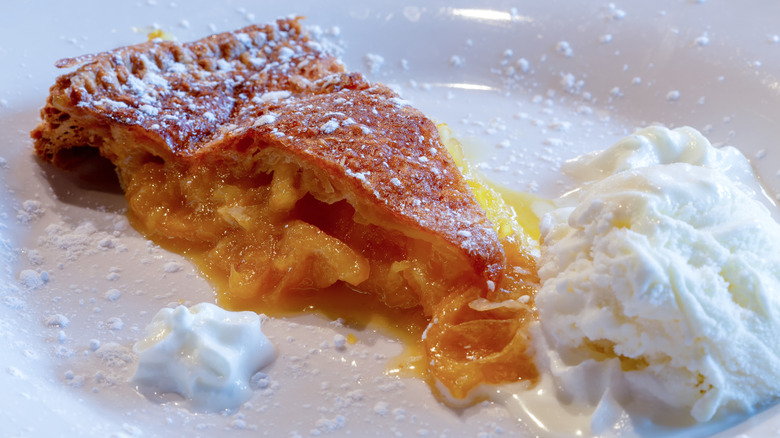The Historical Pie Alison Roman Calls The Best In The World
We typically think of celebrity chefs as being on the cutting edge of food fads (if not creating them), so it comes as no surprise to see someone like Alison Roman authoring a dessert cookbook — the recently published "Sweet Enough" — with recipes like tahini caramel, semolina cake with lemon and fennel, and salted chocolate pudding. Her favorite pie from the book, however, is not a salty one, nor does it contain any particularly au courant ingredients. Instead, she prefers an old-fashioned style of lemon pie inspired by the English immigrant Christian community known as the Shakers.
Roman raves about her Shaker-style lemon pie because it makes use of the entire lemon. In fact, there's no need to grate the rind or squeeze out the juice to make this pie, as many historic Shaker recipes (and Roman's, as well) simply call for the fruit to be sliced — peel and all — then mixed with sugar, eggs, and maybe flour to form the filling. Roman feels that the resulting pie combines all the flavors: There's sourness from the lemon juice, bitterness from the rind, sweetness from the sugar, and even a little bit of salt from the crust. (Some Shaker recipes are even made with a cracker pie crust, although Roman sticks to a standard one.) As Roman tells Today, this pie is "everything you want a lemon bar to be, but more and better."
The Shakers' sustainable foodways were ahead of their time
As Roman notes in her paean of praise to Shaker-style lemon pie, the Shakers applied a nose-to-tail philosophy even to produce, so they used every bit of that lemon (well, maybe not the seeds). In fact, the Shakers were pioneering sustainable eating long before it was in fashion. It wasn't just lemon rinds they ate, but the peels from most types of produce, so they were getting all of that good nutrition at a time when most people were throwing it away or feeding it to farm animals. Shakers were also locavores and into clean eating centuries before people started throwing either term around; they tried to eat only what they could raise themselves. The reason for such sustainability is that they felt that God favored their hard work. A certain segment of the community also embraced ethical vegetarianism back in the 19th century.
If you're wondering why we're using the past tense when discussing the Shakers, it's because, as of 2022, there were just two Shakers left. While at one time there were thousands of Shakers with thriving communities up and down the east coast and extending into the Midwest, one of the central tenets of the faith is celibacy. This means, of course, that there are no little Shakers being born to replenish the ranks. Even though the Shakers themselves are nearly gone, their foodways and recipes remain.

